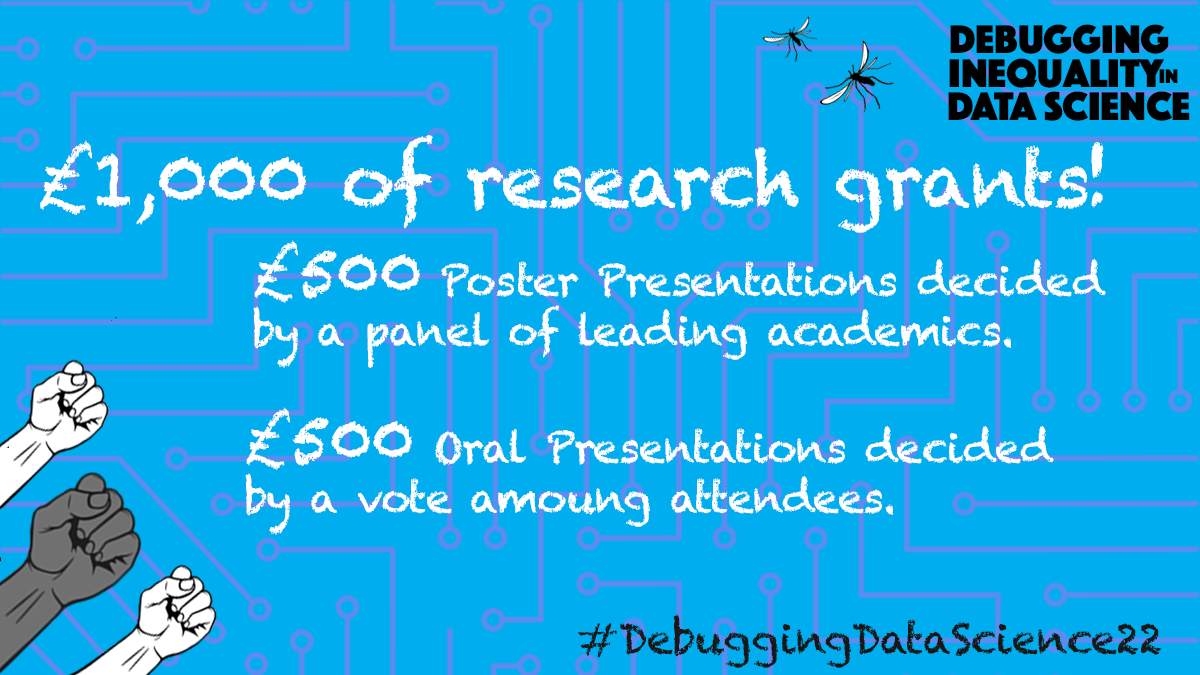Workshop: Debugging (In)equality in Data Science
6 May 2022
Miss this event? Learn more about how researchers shared cutting edge projects and read the reflections of one of the research grant winners, Silvia Pedersoli, here.
The Debugging (In)equality Data Science Workshop aims to foster camaraderie and collaboration between Doctoral Students and Early Career Researchers involved with or interested in computational methods for social sciences.
The event will showcase cutting-edge data science that explores, exposes and tackles (in)equality. A founding principle is to facilitate this type of research and to support the development of junior scholars. Research grants will be available for two projects which align with the workshop principle.
Developed in partnership with the LSE Data Science Institute and the Alan Turing Institute Post Doctoral Enrichment Award, we will bring together key elements from LSE and beyond with the shared goal of reaching graduates, post-doctoral students, and early career researchers. This workshop will provide insights and connections that will assist you on your journey to mobilise data science research for social good.
Activities include:
- Research Grants Competition
- Oral presentations and round table discussions
- A3 poster fair (500 words excluding figures and bibliography)
- Keynote talks from Dr Anjali Mazumber and Dr Stephanie Hare
Call for participants
Do you investigate the potential of data science for social justice? Take part in our unique workshop dedicated to igniting collaboration and exchange on the emancipatory potential of data science. We welcome doctoral students, early career researchers, and faculty who employ computational social science in their research to showcase exciting research into data science enquiries into inequality. Outstanding Masters students’ applications will also be considered.
We invite the submission of proposals for presentations on ongoing or recent research from individual authors or multiple contributors. Proposals that address our key thematic questions are particularly encouraged.
The morning will be reserved for the implementation of computational methods, covering topics such as operationalisation and identity inference. The afternoon will be dedicated to the application of data science in a specific and substantive research context related to (in)equality.
Data Science Implementation
• Operationalisation (Gender, Ethnicity, Sexuality, Class ...)
• Identity Inference (Sources and Approaches)
• Re-imagining Computational Methods
• Combining Computational Methods (Network Attributes, ...)
Data Science Application
• Complete Research Proposals
• Presenting Published Papers
• Data Science for Good (Health, Environmentalism, ...)
• Preventing Harm (Misinformation, Extremism, ...)
The above categories are intended only to provide a general direction for what can be discussed. We welcome submissions on any research topic related to data science and submissions are encouraged from a wide range of disciplines, institutions, and researchers.
Attendees are not required to be in programmes or positions that specifically involve data science and computational methods, but must have a specific interest in the potential of data science to challenge inequality and work for emancipation.
Submissions for posters and oral presentations should be in the form of a 250 word abstract (excluding title), including five key words. If you have questions on topics or participation, please contact Dr. Siân Brooke.
Please note the deadline to register to attend has now passed.

The Workshop
This workshop will take place on LSE Campus from 09:00 - 18:00 (BST) on Friday 6 May 2022. The workshop will combine the benefits of hackathons for collaboration with the value of academic conferences in networking and showcasing your expertise. It is designed to create opportunities for discussions and intellectual and methodological progress, rather than more passive presentation of findings and completed projects.
This workshop will give attendees the opportunity to present their data science tools, proposed projects, and completed research to enhance their work through feedback and networking. Embracing progressive and critical approaches to gender inequality, race equity, queerness, and intersectionality, this engaging and welcoming workshop focuses on addressing the prejudices and biases in data sets and statistical models. The event will enable early career researchers and industry figures to bond over the goal of deploying practical and technologically ingenuous solutions to inequality.
Expected outcomes
The aim of the workshop is to provide attendees with valuable experience in presenting at a conference, whilst learning from, and forging connections with other attendees in the pursuit of challenging inequality through data science.
Successful applicants will be invited to a Slack channel in order to foster connections, in a similar format to hackathons and industry conferences such as CogX. In addition, round table discussions will take place on a range of themes in the morning and the afternoon. The repetition of these discussions will permit those working on methods to attend the roundtable of those working on complementary substantive topics, and vice versa, to facilitate discussions.
Please note the deadline to register to attend has now passed.
Contact
Dr Siân Brooke (LSE Department of Methodology)
Dr Marion Lieutaud (LSE Department of Methodology)
Dr Jonathan Cardoso-Silva (LSE Data Science Institute)
Harassment Policy
In participating, I acknowledge LSE's Policy Against Harassment at LSE Activities and agree that behavior such as the following will constitute grounds for actions against me:
- Abusive action directed at an individual, such as threats, intimidation, or bullying
- Racism, homophobia, and other behaviour that discriminates against a group or class of people
- Sexual harassment of any kind, such as unwelcome sexual advances or words/actions of a sexual nature
If you are involved in or witness any such incident, please inform the event organizers.